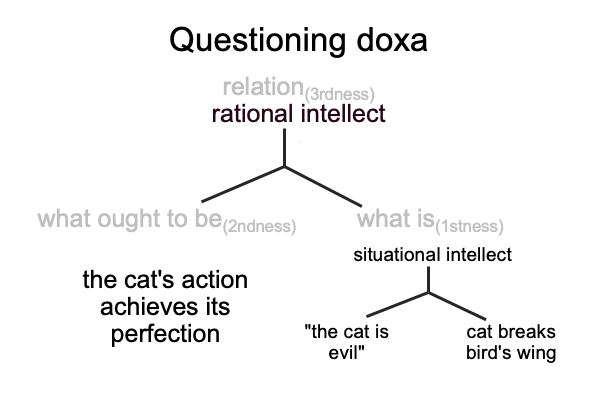0034 On the situation level, animals prepare to act2b.
In contrast, humans generate phantasms2b. What does the thing or event2a mean to me3b?
0035 But, I am not alone.
Therefore, moral meaning plays out in my phantasm2b. The objective object2b may not necessarily trigger action. But, it2b activates a moral order. It triggers an intersubjective being2b.
On one hand, the intersubjective being2b is contiguous with the objective mind-dependent being2b and may be willing to face the test of suprasubjectivity1c.
A phantasm2b will not suffer privation, when its intersubjective reality1b seeks to be contextualized by suprasubjective potential1c.
On the other hand, a phantasm2b may be stated as blather2a. Instead of facing the test of suprasubjectivity1c, the phantasm2b comes out as an event, a statement2a, that seeks to be objectified1b as agreement1a. Agreement1a coordinates perceptions2b and appears to support an intersubjective reality2b that does not need to face the test of suprasubjectivity1c.
After all, if we all agree1a, it2b must be true1c, doesn’t it2b?
This phantasm2b suffers privation, because intersubjective reality1b should be elevated to its suprasubjective potential1c.
Instead, it2b seeks agreement1a, through its own expression2a, in the presence of others.
The observer plans to go to law school.
0036 The graduate student, in some capacity (remember, alcohol is consumed at these parties), knows this.
So, inadvertently, “he” brings what the observer says to generate agreement1a into the suprasubjective realm1c, by questioning “her” opinion.
0037 Here is a picture of the resulting judgment2c.

